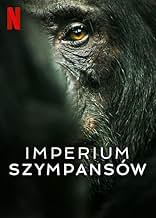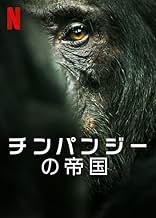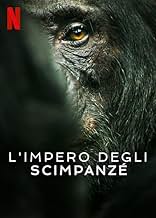En un bosque de Uganda, una numerosa comunidad de chimpancés convive y se desarrolla entre complejas estructuras políticas, dinámicas familiares y pleitos territoriales.En un bosque de Uganda, una numerosa comunidad de chimpancés convive y se desarrolla entre complejas estructuras políticas, dinámicas familiares y pleitos territoriales.En un bosque de Uganda, una numerosa comunidad de chimpancés convive y se desarrolla entre complejas estructuras políticas, dinámicas familiares y pleitos territoriales.
- Elenco
- Elenco
- Nominado a 1 premio Primetime Emmy
- 2 premios ganados y 2 nominaciones en total
Explorar episodios
Opiniones destacadas
When you think of an engaging documentary that stirs the depths of your soul, you might not immediately envision one about the chimpanzees of the Ngogo Forest. Yet, it is in this seemingly obscure corner of the world that we uncover a narrative so captivating, so brimming with emotion and insight, that it leaves us utterly spellbound.
From the very opening scene, the documentary deftly weaves a tapestry of intrigue and wonder. The lush, verdant landscapes of the Ngogo Forest in Uganda serve as a breathtaking backdrop to the lives of our closest genetic cousins. As the camera pans through the forest, we are thrust into the intimate, complex world of these remarkable primates, forcing us to confront the stark reality that we share more than mere DNA with these creatures.
One of the most striking aspects of this documentary is its exploration of the striking similarities between human societies and chimp communities. From their intricate social hierarchies and cooperative behavior to their capacity for empathy and even the politics that govern their societies, these chimps exhibit a stunning likeness to our own world. The filmmakers skillfully draw parallels between the chimps' actions and human behavior, revealing a startling interconnectedness that challenges our very understanding of what it means to be human.
As the story unfolds, we encounter an array of vividly drawn characters, each with their unique personalities and quirks. The filmmakers masterfully capture the tender moments, the heart-wrenching losses, and the fierce battles that define the chimps' lives, making us feel as if we are standing on the forest floor alongside them.
What truly sets this documentary apart, however, is its uncanny ability to make the viewer feel deeply connected to the chimps. We experience their joys and their sorrows, and we cannot help but be awestruck by their resilience and resourcefulness. In one moment, we are left breathless by the audacity of a young chimp challenging the alpha male; in the next, we are moved to tears by the tender care of a mother nursing her infant.
Moreover, the documentary serves as a poignant reminder of the fragile state of our planet. As we witness the deforestation and other human-caused threats to the chimps' habitat, we are forced to reckon with our role in their struggle for survival. This is a call to action, a plea for us to recognize the interconnectedness of all life on Earth, and to cherish and protect the natural world before it is too late.
By the time the credits roll, we are left with an indelible impression of the chimps of the Ngogo Forest: a powerful testament to the resilience of life, the beauty of nature, and the depth of our shared humanity. This documentary transcends the boundaries of the genre, taking us on a mesmerizing journey that has the power to change hearts and minds. It is an experience not to be missed, one that will leave you pondering long after the credits start scrolling.
From the very opening scene, the documentary deftly weaves a tapestry of intrigue and wonder. The lush, verdant landscapes of the Ngogo Forest in Uganda serve as a breathtaking backdrop to the lives of our closest genetic cousins. As the camera pans through the forest, we are thrust into the intimate, complex world of these remarkable primates, forcing us to confront the stark reality that we share more than mere DNA with these creatures.
One of the most striking aspects of this documentary is its exploration of the striking similarities between human societies and chimp communities. From their intricate social hierarchies and cooperative behavior to their capacity for empathy and even the politics that govern their societies, these chimps exhibit a stunning likeness to our own world. The filmmakers skillfully draw parallels between the chimps' actions and human behavior, revealing a startling interconnectedness that challenges our very understanding of what it means to be human.
As the story unfolds, we encounter an array of vividly drawn characters, each with their unique personalities and quirks. The filmmakers masterfully capture the tender moments, the heart-wrenching losses, and the fierce battles that define the chimps' lives, making us feel as if we are standing on the forest floor alongside them.
What truly sets this documentary apart, however, is its uncanny ability to make the viewer feel deeply connected to the chimps. We experience their joys and their sorrows, and we cannot help but be awestruck by their resilience and resourcefulness. In one moment, we are left breathless by the audacity of a young chimp challenging the alpha male; in the next, we are moved to tears by the tender care of a mother nursing her infant.
Moreover, the documentary serves as a poignant reminder of the fragile state of our planet. As we witness the deforestation and other human-caused threats to the chimps' habitat, we are forced to reckon with our role in their struggle for survival. This is a call to action, a plea for us to recognize the interconnectedness of all life on Earth, and to cherish and protect the natural world before it is too late.
By the time the credits roll, we are left with an indelible impression of the chimps of the Ngogo Forest: a powerful testament to the resilience of life, the beauty of nature, and the depth of our shared humanity. This documentary transcends the boundaries of the genre, taking us on a mesmerizing journey that has the power to change hearts and minds. It is an experience not to be missed, one that will leave you pondering long after the credits start scrolling.
An incredible documentary following two chimp clans in Kibale National Park. I was immediately captivated, but motivated to finish the whole thing purely to discover what becomes of Gus, a young male chimp, in his quest to find a foothold within his clan.
And that's what is great about this series - I became emotionally invested in these chimps and their lives. I was able to relate to some of the decisions they made, particularly when decisions centered around motherhood and protecting infant chimpanzees. I felt sad for some, happy for others, and even annoyed at certain strategies a few adopted. This is not just brilliant production and beautifully captured shots of Kibale and the chimps, but a great story which is also well narrated.
And that's what is great about this series - I became emotionally invested in these chimps and their lives. I was able to relate to some of the decisions they made, particularly when decisions centered around motherhood and protecting infant chimpanzees. I felt sad for some, happy for others, and even annoyed at certain strategies a few adopted. This is not just brilliant production and beautifully captured shots of Kibale and the chimps, but a great story which is also well narrated.
10geowolff
I've never seen anything like this.
Animal documentaries, especially African animal films have become commonplace and frankly rather predictable. But Chimp Empire is something new. This four-episode series is like watching Game of Thrones on a more intimate and intense scale. Much of the credit goes to the cinematographers who have managed a vital technique. Somehow they have brought us so close into this Ugandan chimp tribe the we can see every facial expression, look into every eye and recognize all of the players. Like humans, they play subtle politics, make war, care for children and kill enemies. Narrator Mahershala Ali weaves the power struggles of these personalities so subtly that he manages to amplify the power of jaw-dropping scenes.
I don't know how they did it, but I'll be watching all four episodes.
Animal documentaries, especially African animal films have become commonplace and frankly rather predictable. But Chimp Empire is something new. This four-episode series is like watching Game of Thrones on a more intimate and intense scale. Much of the credit goes to the cinematographers who have managed a vital technique. Somehow they have brought us so close into this Ugandan chimp tribe the we can see every facial expression, look into every eye and recognize all of the players. Like humans, they play subtle politics, make war, care for children and kill enemies. Narrator Mahershala Ali weaves the power struggles of these personalities so subtly that he manages to amplify the power of jaw-dropping scenes.
I don't know how they did it, but I'll be watching all four episodes.
I am almost 60 years old, and I have probably seen upwards of 500 nature documentaries in my lifetime. Short of Planet Earth, which was as epic as is possible, this just might be the best one I've ever seen. It certainly is the best documentary I've seen about a specific clan. I felt like I was right there with them. Like I was feeling what they were feeling. Their fears, their hopes, their joys, their silly moments, and their terrifying moments. The cinematography is incomprehensively superb. At its most powerful moments, it is gut wrenching. As beautiful as some moments are, "at play in the Fields of the Lord," others are devastating. I wish the drive to wage organized, strategized war for nothing more than power were limited to our broken species. There are scenes that sent chills up my spine, because literally the only difference between what we are seeing and what we know has happened for millennia with humans, is the absence of shields and weapons Watching what happens despite the aggressors having all the food and space they need is pretty devastating. If only we could explain to them that we've decimated their numbers so terribly that they just can't afford to kill each other. In any event, difficult moments aside, you'll really want to watch this. It's the closest you could ever dream of coming to being inside a chimp society.
Im not an Chimpanzee expert by any means, but after watching this 4 Part Documentary, im confident to say, that i learned quite a lot, by seeing this. It was super interesting to watch and shot so beautfiful. Also it was narrated very well and the way they gave each Chimp a name and certain characteristics about them, gave the viewer an opportunity to connect to these chimps fairly quick and so with that, it was a really deep experience. In my opinion each episode had the perfect length and from what ive read in an article, is that they had camera crews, which filmed for over 400 days for this project. Basically following these chimps each day. And that really shows itself in each episode. So, do you wanna dive deep into the forest? Go ahead. 9/10🔥👏🏼
Selecciones populares
Inicia sesión para calificar y agrega a la lista de videos para obtener recomendaciones personalizadas
- How many seasons does Chimp Empire have?Con tecnología de Alexa
Detalles
- Fecha de lanzamiento
- País de origen
- Sitio oficial
- Idioma
- También se conoce como
- Chimp Empire
- Productoras
- Ver más créditos de la compañía en IMDbPro
- Tiempo de ejecución
- 50min
- Color
- Mezcla de sonido
- Relación de aspecto
- 16:9 HD
Contribuir a esta página
Sugiere una edición o agrega el contenido que falta
























